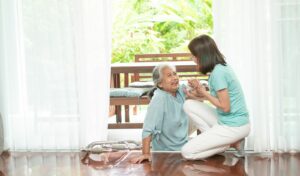Tips to Help a Senior Reduce the Risk of Falls as They Age
The risk of falling can affect anyone, of any age. However, the older you get, the greater the risk, especially if you have health-related challenges, have suffered significant injuries that caused the loss of strength and balance in your legs, or are dealing with other conditions that are commonly associated with aging. Having companion care at home services can assist a senior in avoiding some risk hazards.

For seniors, worrying about falling can be very real. And very close. Some elderly men and women often avoid going out and participating in activities they used to enjoy simply because they have lost their balance, nearly fell, or fell at home or while out. The last thing they want is to have an adult child, spouse, sibling, or even a friend tell them they should “stop doing” various things they enjoy.
Yet, they are not completely helpless in improving safety. There are various steps or things they can do that might improve their potential safety at home and, ultimately, reduce the risk of falls as they get older.
Let’s look at a few tips that may just help an elderly person in your life remain a little safer and reduce the risk of falls as they age.
Tip #1: Understand their limitations.
It’s easy to say that you know your limits, but how often do you understand them, especially as you get older? You might be in your 40s or 50s at the moment, personally, but can you do the same things (physically) that you could in your 20s or even early 30s? Most likely not, at least not to the same level as you had in those younger years.
For aging men and women in their 60s, 70s, or 80s, there is a growing list of things they are no longer able to do that had once been relatively simple. Yet, they continue to try to do them even though they know it’s more difficult or potentially more dangerous.
For example, some seniors in their mid-to-late 70s are still getting up on ladders, climbing up to clean out the gutters in the late fall season where they could hire somebody to do that for them. That’s just a simple example, but it shows that somebody of that age doesn’t understand their limitations, even though they may be acutely aware that they exist now.
Tip #2: Improve lighting inside and out.
This is especially important during the winter months when the days are darkest, but it also pertains to the summer months which have the highest amount of natural light throughout the day. When the sun goes down, the shadows grow long. This has a nasty way of hiding objects on the ground, a narrow ramp, a short step, or even the edge of a rug that has turned up.
You can help the senior make sure the lighting is good, that the bulbs are changed out, that the proper wattage is used in each lamp or ceiling light, and that the outdoor lights are also in good working condition throughout the year.
Tip #3: Remove tripping hazards.
It’s easy to get caught up in the hustle and bustle of daily life, to drop a bag on the kitchen floor to run to the bathroom, and then forget about it. For a senior, this can be a serious tripping hazard. If they have a habit of leaving things lying around in the hall, on their bedroom floor, on the kitchen floor, etc., they should be encouraged to adjust that habit and make sure things are put away properly.
Tip #4: Talk about companion care at home.
Getting up in the morning, taking a shower, getting dressed, going to the store, and more can all pose tripping hazards for a wide range of reasons. With companion care at home, seniors can have the physical assistance needed to reduce the risk of falling during the day.
If you or an aging loved one are considering Companion Care at Home Services in the Lenexa KS area, please contact the caring staff at Elder Care of Kansas City, today.
Proudly serving Jackson, Clay, Platte, and Cass Counties in Missouri as well as Johnson and Wyandotte Counties in Kansas for over 30 years. Call us at 816-333-3322.
- The Importance of Supportive Furniture for Seniors Aging in Place - October 17, 2024
- Home Care Assistance and Healthy Routines for Seniors - October 3, 2024
- How Personal Care At Home Helps Seniors Avoid Falls While Bathing - September 17, 2024
